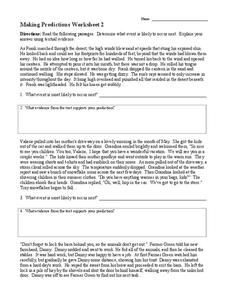Curated OER
Clouds and What They Mean
An excellent resource on cloud types and descriptions could be a valuable addition to your science lesson. After kids learn the correct vocabulary to describe clouds, they complete several worksheets and thermometer activities before...
Super Teacher Worksheets
Types of Clouds
What's the term for clouds that look like fluffy cotton balls? What about thick, gray clouds? Learn the names and descriptions for each type of cloud with a instructional activity and activity. Learners read four columns of high-level,...
Sunburst Visual Media
Clouds
Support science instruction with a combination of engaging activities and skills-based worksheets that focus on clouds. Learners take part in grand discussions, write an acrostic poem, complete graphic organizers, solve word puzzles, and...
Berkshire Museum
Where’s the Water?: Acting Out Science Cycles
Young scientists transform themselves into rivers, oceans, clouds, and drops of water in order to explore the water cycle. After assigning and explaining to students their different roles in the activity, the teacher reads aloud a...
TLS Books
Neptune
Did you know that Neptune is named after the Roman god of the sea? Young astronomers read about this and other facts about the eighth planet from the sun in a short informational text passage.
Education World
Every Day Edit - The Big Wind
In this everyday editing learning exercise, students correct grammatical mistakes in a short paragraph about the strongest wind ever measured. The errors range from punctuation, capitalization, grammar, and spelling.
Worksheet Web
Let it Snow
After reading an informational text detailing the ins and outs of snowflakes, scholars draw their own special design then work cooperatively to role play a snowman building scenario.
Macmillan Education
Understanding Poetry (Elementary)
Introduce young readers to poetry analysis with a learning exercise that uses Emily Bronte's "Spellbound" to model how poets use word choice, the sounds of words, the repetition of words, and rhyming patterns to create the mood, tone,...
Teach-nology
The Big Bad Storm
Get ready for the big storm with a vocabulary activity! Using a word bank and context clues, young learners fill in the blanks in a passage about a day at the park that leads to stormy weather.
Simply Worksheets
Solar System - Identifying Planets
In this space science worksheet, students read the five descriptions of various planets and match the description with the picture of the planet.
K12 Reader
Adjective Synonyms
Practice identifying adjectives and using synonyms with one exercise! Learners find the adjective in each sentence and replace it with a synonym from the word bank when they rewrite the sentence.
K12 Reader
What’s the Forecast?
A reading comprehension passage is illustrative for both language arts and earth science skills. Using context clues, learners find out how to predict the weather using various tools. They then answer five reading questions about what...
Worksheet Web
Learning about Volcanoes
There's something about the classic volcano demonstration that can grab any learners' attention. Scholars begin with a reading and grand conversation about volcanoes, construct an erupting volcano using vinegar and baking soda, then show...
Rhythm Rhyme Results
Whatʼs the Same and Whatʼs Different?
Learn about radiation, convection, and conduction with a multiple choice worksheet. Each question prompts kids to decide what is different about each form of heat energy transfer, and what is the same.
Prestwick House
The House on Mango Street Activity Pack
Enrich a unit on The House on Mango Street by Sandra Cisneros with a selection of related activities. The packet contains nine activities that go from pre-reading through wrapping up the novel. Young readers work on studying author's...
Signing Time Foundation
What is the Water Cycle?
Dive into an exploration of the water cycle cycle with this simple earth science lesson. After first discussing where rain comes from, young scientists define the terms condensation, evaporation, transpiration, and precipitation as a...
NOAA
The Cycle of Water
Help young scientists get to the bottom of the water cycle with this comprehensive earth science lesson. After first viewing and discussing presentations about the states of water and the water cycle, the class performs a series of...
K12 Reader
Pronouns and Antecedents
Practice the basics of pronoun-antecedent agreement by assigning this exercise. Class members identify both the pronoun and the antecedents in ten sentences.
Read Theory
Analogies 1 (Level 6)
Get your middle schoolers up to scratch with analogies using this worksheet. Pupils complete 10 analogies by determining the associations between the words and using the provided bridge sentences.
Read Theory
Analogies 2 (Level 6)
Activate analogy skills with a straightforward exercise. Learners complete 10 analogies, using the bridge sentences provided as support while they determine word relationships.
K12 Reader
What Happens Next?
While your students may not be psychics, that doesn't mean they can't predict what will happen next in a story. To hone this important reading comprehension skill, young learners read a series of three short passages before writing a...
Soft Schools
Metaphor and Similes in Literature: A Challenge
After identifying the similes and metaphors in a series of lines from poems, individuals then explain what is being compared and the characteristics the two items share.
E Reading Worksheets
Making Predictions #2
What happens next? Learn to make predictions with five short passages. As kids finish reading each passage, they jot down what they think will happen next, as well as the evidence from the text that supports their prediction.
TLS Books
Jupiter
Young astronomers read an informational text on the gas giant, Jupiter. Then they answer four multiple choice questions based on what they read.
Other popular searches
- Different Types of Clouds
- Types of Clouds
- Clouds and Precipitation
- Cirrus Clouds
- Making Clouds
- Weather Unit Plan Clouds
- Picture of Clouds
- Cumulus Clouds
- Stratus Clouds
- Clouds Experiment
- Weather Clouds
- Weather and Clouds

























